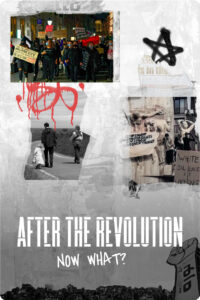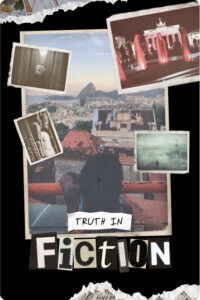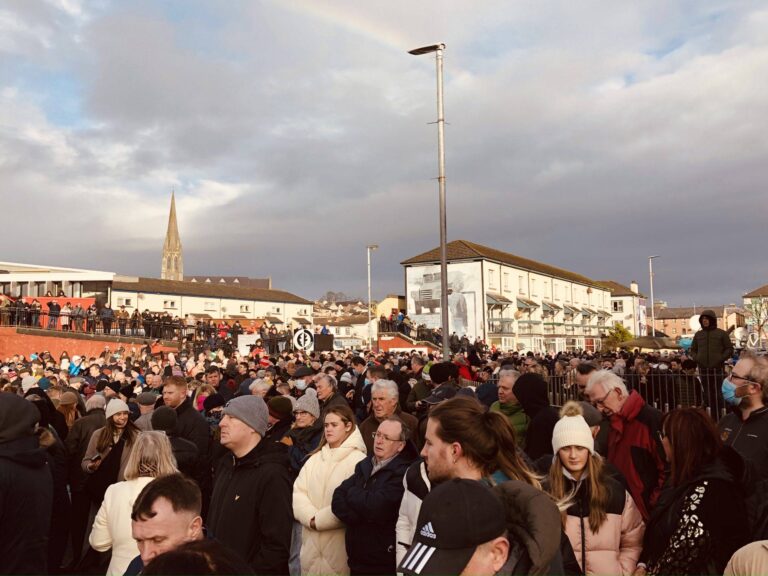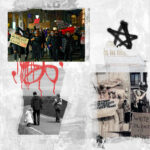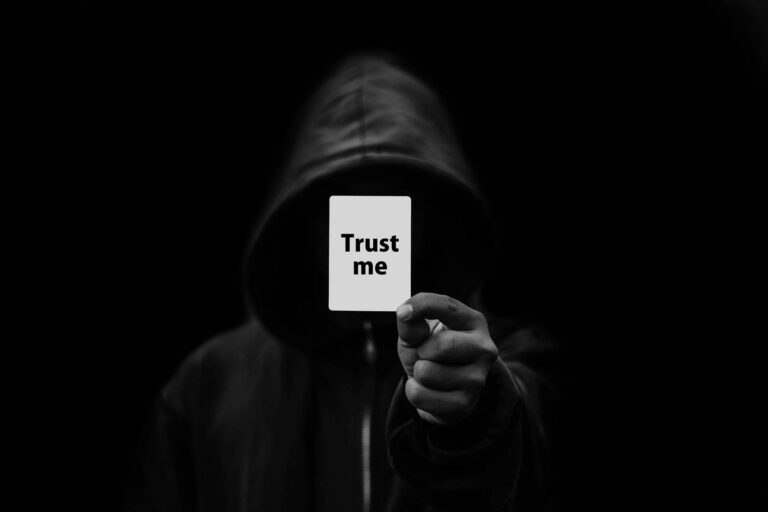When you arrive on the heights of Derry, Northern Ireland’s only completely walled city, the first thing you notice is its river. The city is a basin split in half by the Foyle, that separates the catholic and protestant areas. In 1977, an orca came up to find some salmon and the inhabitants of both sides had come together by the waterside to admire it for several days. This scene might seem banal for any other city in the world, but in Derry you can’t help but break a smile about it since it’s so rare. Built in 2011, the Peace Bridge was an attempt to bring the two communities together, but the divisions still resist local initiatives.
It just happens that Bloody Sunday’s 50th anniversary fell on a Sunday. Under a drizzle, the inhabitants retraced the itinerary of the 1972 protesters. “It was a civil rights march so that the Catholics have the right to vote, to find somewhere to live and to study like everyone else,” notes Denise, who teaches history at St Columb’s College. “Without these men and women, we wouldn’t have the same rights we have today, so I feel particularly grateful.” When the crowd arrived before the victims’ memorial, the sky completely cleared, and the sun came out. “It’s God giving us a little pat on the shoulder,” jokes James. In 1972, he saw a man get shot as he left his hiding place to save a victim, “It was really cold that day, but just as beautiful as it is right now.”
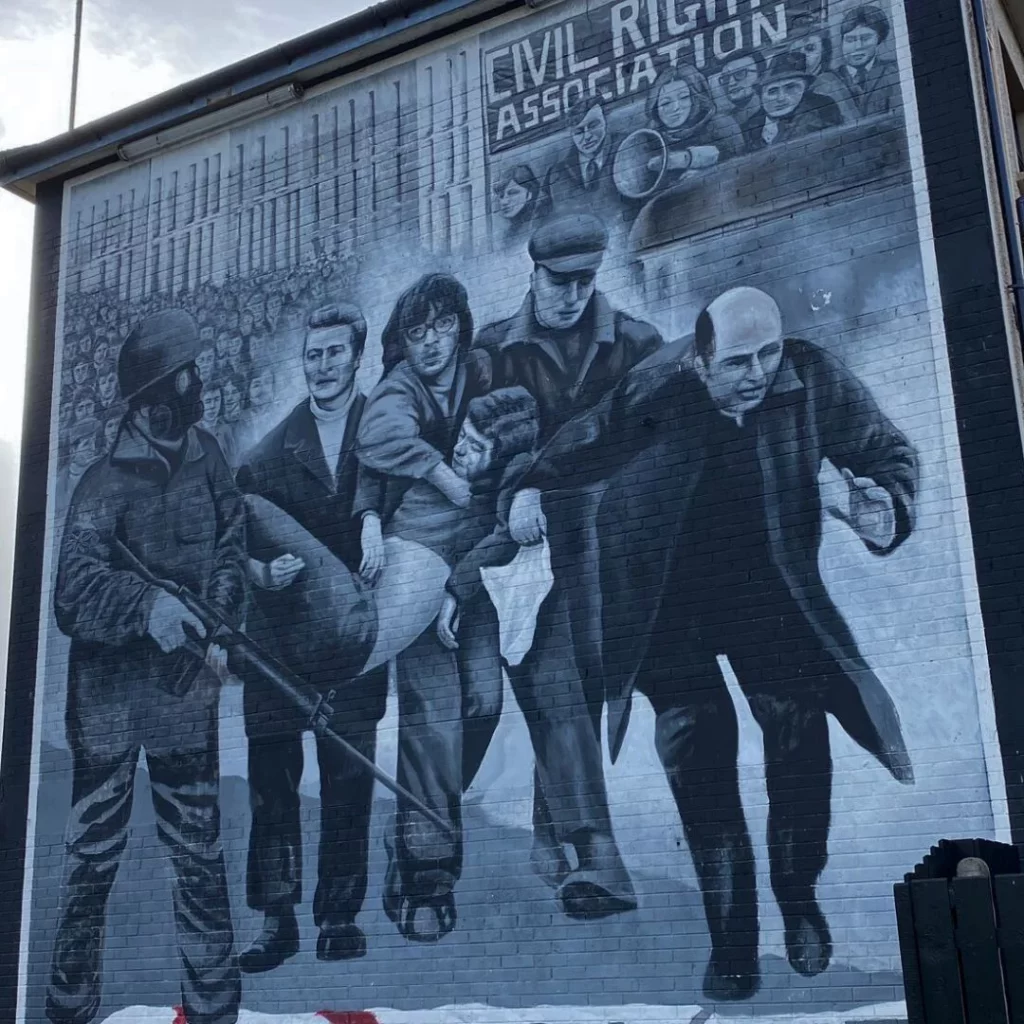

Whether they had seen the violence in directly from the streets or through their windows, the inhabitants of Derry remember it as if it were yesterday. “I was 18 years old, and I was walking with a group formed of more radical protesters,” remembers Eamonn Lynch, an ex-detainee of Long Kesh, a prison where the British locked up men suspected of being involved with the IRA (the Irish Republican Army, a paramilitary organisation who fought against British rule in Northern Ireland) “We began throwing stones as usual at the patrol who retaliated with CS gas and rubber bullets.” And then, the paratroopers were suddenly ordered to fire real bullets. “Luckily, I was at the front of the procession so I could run away to a street on the left to hide behind a low wall. Raising my eyes, I recognised Micky Bridge and his hair so bright that it almost appeared white. He was a well-built man, a bit older than me and he had a solid reputation in Derry. Mickey flung his hands up in defiance of the soldiers who had just killed a teenager in front of him.” A few seconds later, the young man was on the ground like 17 other people battered that day.
The victims’ innocence was only definitively proven 38 years later by the Saville Inquiry, in 2010, after 12 years of investigation
A quest for justice
The bullet holes are still visible on the Museum of Free Derry’s wall which recounts the story of the Civil War, also known as the Troubles. It’s here where Paul Doherty ends his visits in the Catholic part of Bogside, an old stronghold of the IRA. The tour guide is also the son of Patrick Doherty, who was shot in the back whilst crawling to find refuge. Over the years, the British Army has maintained that they only fired on armed men and on those in possession of bombs. The victims’ innocence was only definitively proven 38 years later by the Saville Inquiry, in 2010, after 12 years of investigation. Contrary to their earlier positions, the soldiers ended up admitting that the victims were indeed unarmed, which led David Cameron, the British Prime Minister at the time, to issue an apology for the “unjustified and unjustifiable” acts.
But reconciliation remains difficult with the feeling justice has not been made. “It’s a step in the right direction but the majority of those soldiers are decorated service men you know, how do you want me to live with that?” Paul Doherty is trying to put the record straight in his own way with his guided visits. “I’m telling it exactly how it was,” warns the 50-year-old with his arms crossed. For years, we were seen as the bad guys, and the British as heroes. The tourists need to know what really happened here.” To this day, only Soldier F has been charged for murdering two protesters, but his case was adjourned in 2021. Even worse for the families, the British Government has recently appealed Parliament for an amnesty project to stop investigations and therefore the charges of crimes committed by both sides during the Civil War.
Youth faced with toxic heritage
But even if Derry’s youth no longer fill the city’s prisons and graveyards, their parents’ past continues to take its toll on them. Unemployment rates are through the roof, poverty is taking over in some areas of the city (Catholic ones for the most part) and many lack any real prospects. Northern Ireland has the highest suicide rates of the United Kingdom, and the authorities are particularly concerned with young men’s mental health. The Foyle Search and Rescue Service is reported to act more than two hundred times every year to prevent drownings. “Everyone has been affected here, and regardless of if you’re catholic or protestant, you know someone who knows someone, or you’ve even lost a loved one,” explains Jane Buckley who is finishing a series of books about the civil war. “Psychiatric disorders are widespread in Derry because it was absolute carnage, a real war! And it’s only now that people are speaking out. Two or three generations of people have been wounded, so of course that affects kids while growing up.”
Over the years, families have avoided this topic of conversation within the home. “It was too painful,” remembers Paul Doherty aged 8 when he lost his father. “My mother ended up alone with 6 children to take care of, including a 7-month-old baby.” Parents also hid their anger so that their kids wouldn’t take up arms to get revenge. “The evening after Bloody Sunday, I saw lots of ordinary people become extraordinary and queue up to join the ranks of the IRA,” remembers Eamonn who was already a member at the time. “They [the British] wanted to teach us a lesson, but the opposite happened. We were paying taxes so that the army protects us, and what we got instead was them killing innocent people.” The next year was the deadliest with 479 deaths out of the total 3,500 civil war victims. “In 1972, bombs were going off every day.” Many men choose to sweep their traumas under the rug out of shame in an old-fashioned society that leaves little to no room for emotions. 50 years later, his operations in the IRA are still taboo for Eamonn Lynch. Did he help to set bombs off, like his best friend who accidentally blew himself up by denotating one too early? His 15-year-old daughter learnt by chance that he had been imprisoned for 13 months, seeing his photo in an article byofin the Derry Journal that paid tribute to the former detainees of the conflict.
But even if Derry’s youth no longer fill the city’s prisons and graveyards, their parents’ past continues to take its toll on them
Divisions resist peace agreements
On Bogside’s precarious blocks of flats, passers-by are constantly reminded of the past. On one of the most famous war memorials, you can see the priest Edward Daly wave a white handkerchief whilst he tries to shield a dying teenager, 17-year-old Jackie Duddy, who was a celebrated Olympic Boxing hopeful. During the commemorations, many religious leaders took to the microphone to encourage youth to get past the divisions of their elders. “Never again do we want to see the oppression of one culture instead of another,” reminded Reverend David Latimer in front of a mostly Catholic crowd. “The time has come to ride the tide of change together, for a common future that would be envied worldwide. It will be testament to those who fought yesterday and the heritage of those that will follow them hereafter.”
But reality is less joyful, and one only needs to look at the colours of children’s uniforms to guess their religion. Protestants often wear burgundy or blue while Catholics wear green most of the time. “In my secondary school, rumours have it that protestants are evil, that they have prettier houses and more money than us,” says Lucie who doesn’t seem bothered in the slightest by the cold, going home in her bottle-green skirt. “I would like schools to be more mixed because we can’t really meet each other, the protestants live on the other side of the river and that doesn’t help to move past all these stereotypes.” History continues to be taught in differing ways to children on both sides. “The way you hear about the conflict depends on your background. Usually after a war, history is written by the winners, but with that everyone loses,” underlines Eammon Lynch, ex-member of the IRA.
Help us tell the world to you !
Frictions is launching its club : by supporting Frictions, you’ll be supporting a community of authors and journalists who tell the world through intimate stories!

The river Foyle also serves as a political bulwark between those who are in favour of a united Ireland (the republicans and nationalists who are mostly catholic) and those who are loyal to the British Crown (the unionists and the loyalists, mostly protestant). On one side we see green, white, and orange flags of the Irish Republic, and on the other side pavements painted in colours of the Union Jack. The fact that the inhabitants can’t even agree on their city’s name is further proof in the pudding that these fractures aren’t only a thing of the past. Unionists call it Londonderry and it’s Derry for the Republicans. Peace seems to be hanging on a hair thanks to the Good Friday Agreement signed in 1998. The agreement foresees the sharing of power between both sides, but with Brexit, the border issue emerges again, an unbearable betrayal for the unionists who feel deserted by London.
“How long? How long must we sing this song,” asks Bono, leader of the Irish rock band U2, in the song ‘Sunday, Bloody Sunday’ released in 1983. “It would be great if one day we weren’t obliged to talk about the Troubles anymore, and that instead we’d tell our children about how the Irish managed to become united as a single people, moving past the religious and political divisions. We can’t keep living in the past,” concludes Eamonn Lynch. “I was a great optimist in 1972 and my ideas haven’t changed. I’m still convinced that our island should be one united Ireland, free from any sort of British intervention.” Reunification of their island is just a matter of time for the Republicans and should enable them to resolve all these divisions while the protestant population in Derry has reduced close to nothing in the last 50 years.

